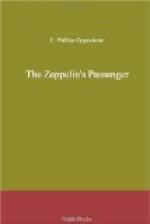Lessingham’s disclaimer was in quite the correct vein.
“You must both come again very soon,” their hostess concluded, as she shook hands. “I enjoyed our bridge immensely.”
The two men were already on their way to the door when a sudden idea seemed to occur to Captain Griffiths. He turned back.
“By-the-by, Lady Cranston,” he asked, “have you heard anything from your brother?”
Philippa shook her head sadly. Helen, who, unlike her friend, had not had the advantage of a distinguished career upon the amateur dramatic stage, turned away and held a handkerchief to her eyes.
“Not a word,” was Philippa’s sorrowful reply.
Captain Griffiths offered a clumsy expression of his sympathy.
“Bad luck!” he said. “I’m so sorry, Lady Cranston. Good night once more.”
This time their departure was uninterrupted. Helen removed her handkerchief from her eyes, and Philippa made a little grimace at the closed door.
“Do you believe,” Helen asked seriously, “that Captain Griffiths has any suspicions?”
Philippa shrugged her shoulders.
“If he has, who cares?” she replied, a little defiantly. “The very idea of a duel of wits between those two men is laughable.”
“Perhaps so,” Helen agreed, with a shade of doubt in her tone.
CHAPTER X
Philippa and Helen started, a few mornings later, for one of their customary walks. The crystalline October sunshine, in which every distant tree and, seaward, each slowly travelling steamer, seemed to gain a new clearness of outline, lay upon the deep-ploughed fields, the yellowing bracken, and the red-gold of the bending trees, while the west wind, which had strewn the sea with white-flecked waves, brought down the leaves to form a carpet for their feet, and played strange music along the wood-crested slope. In the broken land through which they made their way, a land of trees and moorland, with here and there a cultivated patch, the yellow gorse still glowed in unexpected corners; queer, scentless flowers made splashes of colour in the hedgerows; a rabbit scurried sometimes across their path; a cock pheasant, after a moment’s amazed stare, lowered his head and rushed for unnecessary shelter. The longer they looked upwards, the bluer seemed the sky. The grass beneath their feet was as green and soft as in springtime. Driven by the wind, here and there a white-winged gull sailed over their heads,—a cloud of them rested upon a freshly turned little square of ploughed land between two woods. A flight of pigeons, like torn leaves tossed about by the wind, circled and drifted above them. Philippa seated herself upon the trunk of a fallen tree and gazed contentedly about her.
“If I had a looking-glass and a few more hairpins, I should be perfectly happy,” she sighed. “I am sure my hair must look awful.”




